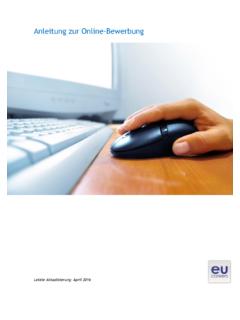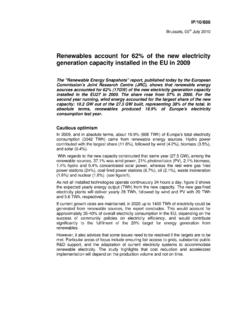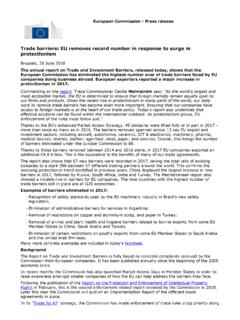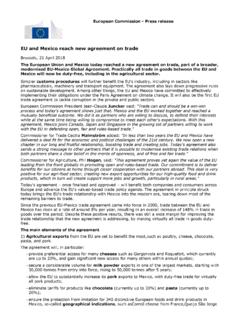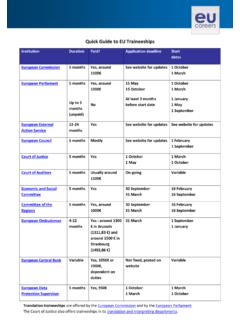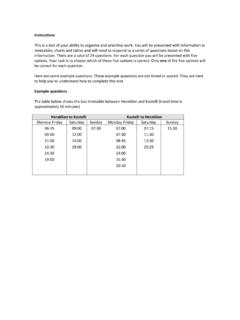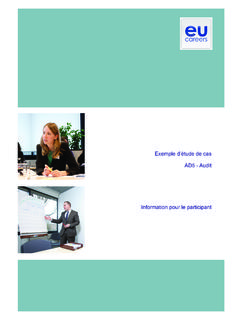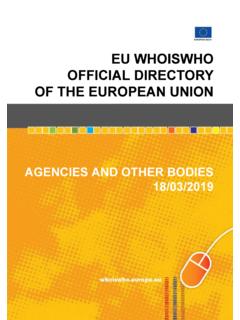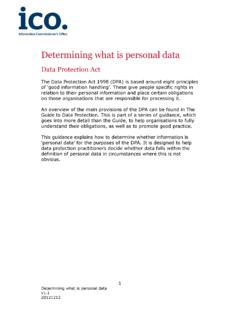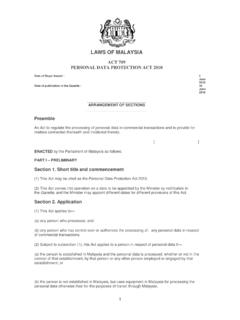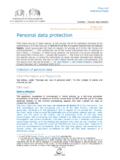Transcription of (2015-2020) - Europa
1 STATE OF THE UNION 2017 FREE FLOW OF NON- personal DATAFree flow of non- personal dataWhat is the free flow of non- personal data ?Free flow of non- personal data means unrestricted movement of data across borders and IT systems in the EU. It is a key building block of the Digital Single Market and considered the most important factor for the data economy to unleash its full potential and to double its value to 4% of GDP in 2020. The new measures are in line with already existing rules for the free movement and portability of personal data in the is the situation today?The European Commission has identified 4 types of obstacles to data mobility within the EU:1 Synopsis Report of the Public Consultation Building a European data Economy Annex to the Synopsis Report of the Public Consultation Building a European data Economy.
2 From Eurostat, Factors limiting enterprises from using cloud computing services, by size class, EU-28 , 2014 (% enterprises using the cloud); localisation restrictions by Member States public authorities162% of surveyed respondents stated that data localisation restrictions should be removed 57 % of large businessesand 38 % of SMEslack trust due to risks of security breaches2 Complex EU legal patchwork applicable in different sectors / situations, but lack of overarching principle of free flow of non- personal data72 % of surveyed SMEs that use cloud services intended to switch providers57% of these experienced difficulties in doing soLegal uncertainty leading to caution on the market regarding cross-border data storage and processing1 Obstacles to movement of data across IT systems (so-called vendor lock-in)1 Lack of trust due to security risks and concerns about the cross-border availability of data for regulatory purposes 55% of surveyed respondents believe that legislative action was necessary What does the Commission propose?
3 One single principle across the EU, guaranteeing free flow of non- personal data : The free flow of non- personal data principle removes unjustified data localisation restrictions imposed by public author ities, enhancing legal certainty and raising trust. The principle of data availability for competent authorities makes sure that the data remains accessible for regulatory and supervisory control also when stored or processed across borders in the EU. Actions to encourage cloud service providers to develop self-regulatory codes of conduct for easier switching of provider and porting data back to in-house servers. Security requirements on data storage and processing remain applicable, also when businesses store or process data in another Member State.
4 The same applies when they outsource data processing to cloud service providers. Single points of contact in each Member State, to liaise with other Member States contact points and the Commission to ensure the effective application of the new rules on the free flow of non- personal are the benefits for the EU?A basis to maximise the full potential of the Digital Single Market3:Examples of predicted additional revenue by sectors (2015-2020) assuming that data localisation restrictions are removed4:3 EU GDP is predicted to increase by 8 billion / year : from ECIPE, Policy Brief Unleashing Internal data Flows in the EU: An Economic Assessment of data Localisation Measures in the EU Member States , December 2016.
5 Savings of up to 120% .. : from study SMART 2015/0016, London Economics Facilitating cross border data flow in the Digital Single Market , From study SMART 2014/0031, Deloitte, Measuring the economic impact of cloud computing in Europe .Easier to do business across borders in the EU (no duplication of data storage facilities anymore).The new rules complement already existing rules for personal data that will fully apply as from 25 May 2018. Together both frameworks will enable free movement of all types of data in the Single competitive EU Single Market for secure, reliable and affordable cloud costs for data services and greater flexibility for companies could boost EU GDP by up to 8 and startups will more easily scale up and enter new markets across savings of up to 55% for service providers.
6 Lower prices for users of data storage and processing the scale up of innovative data services across the + billion+ billion+ billion+ billionFinance & business servicesDistribution, retail & hotelsGovernment, education & health
